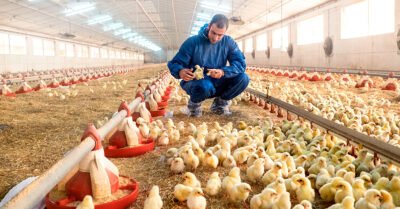Genetic Modification and Its Impact on the Immune System and Vaccination Response in Poultry Farms

Dr. Majed Hamed Al Saegh / poultry pathologist / Australia
- Introduction
Genetic modification (GM) in poultry farming is an advanced biotechnological approach aimed at improving productivity, disease resistance, and adaptability in poultry. By altering specific genes, researchers can enhance desired traits while addressing challenges associated with traditional breeding methods. This report explores the impact of GM on the immune system of poultry and its implications for vaccination response.
- Genetic Modification in Poultry
2.1 Technologies Used
CRISPR-Cas9: Enables precise genome editing by targeting specific DNA sequences.
Transgenic Techniques: Incorporation of genes from other species to confer new traits.
Gene Knockout: Deactivation of specific genes to study their function or mitigate undesirable traits.
2.2 Applications in Poultry Farming
Enhanced Disease Resistance: Modifications to increase resistance to pathogens like avian influenza and Newcastle disease.
Improved Productivity: Genetic edits to optimize growth rates and egg production.
Therapeutic Production: Creation of chickens producing pharmaceutical proteins in eggs.
- Effects of Genetic Modification on the Immune System
3.1 Enhanced Innate and Adaptive Immunity
Genetic modifications can improve the production of key immune molecules such as cytokines and antimicrobial peptides, enhancing resistance to infections.
Specific gene edits, like modifying receptors for viral entry, reduce susceptibility to diseases like avian influenza.
3.2 Potential Risks
Immune Dysregulation: Modifications may inadvertently lead to hyperactivation or suppression of the immune system.
Genetic Uniformity: Homogeneous populations may become vulnerable to new or emerging pathogens.
3.3 Case Studies
Marek’s Disease: Studies show genetic variation in resistance to this disease, emphasizing the potential of GM.
Avian Influenza: Genetically modified chickens resistant to virus transmission have been developed to curb outbreaks.
- Vaccination Responses in Genetically Modified Poultry
4.1 Improved Vaccine Efficacy
Consistent Immune Responses: Genetic uniformity enhances predictability of vaccine outcomes, simplifying vaccination protocols.
Optimized Antigen Recognition: Enhanced presentation of vaccine antigens improves immune responses.
4.2 Challenges
Mismatch with Conventional Vaccines: Traditional vaccines may require reformulation to align with genetically modified immune profiles.
Risk of Immune Tolerance: Over-suppression of inflammation could diminish vaccine efficacy.
4.3 Reduced Vaccination Dependency
GM birds resistant to common diseases could reduce the need for frequent vaccination, lowering costs and labour.
- Ethical and Environmental Considerations
5.1 Ethical Issues
Concerns about animal welfare and the unintended health impacts of genetic modification.
Debate over the acceptability of genetic alterations in farm animals.
5.2 Environmental Impact
Potential Gene Flow: Risk of GM traits spreading to wild populations through accidental breeding.
Biodiversity Concerns: Reduced genetic diversity may affect the long-term adaptability of poultry populations.
- Applications in Poultry Management
6.1 Customized Vaccines
Vaccines tailored to match the modified immune systems of GM poultry can enhance disease prevention strategies.
6.2 Integration with Precision Farming
Combining GM birds with technologies like early detection systems enables real-time monitoring and rapid response to disease threats.
- Future Directions
7.1 Genetic Modifications for One Health
Developing birds that not only resist poultry-specific diseases but also reduce zoonotic risks.
Aligning GM approaches with One Health principles to safeguard human, animal, and environmental health.
7.2 Addressing Environmental Stressors
Modifications to improve resistance to environmental challenges, such as ammonia levels in poultry houses, can optimize overall health and productivity.
7.3 Enhancing Vaccine Strategies
Focus on next-generation vaccines, including DNA and mRNA-based formulations, for use in GM poultry populations.

- Conclusion
Genetic modification in poultry farming presents transformative potential in enhancing disease resistance and optimizing vaccination responses. While the benefits are promising, careful consideration of ethical, environmental, and biosafety aspects is critical. Ongoing research and innovation are essential to balance productivity gains with sustainable and ethical practices in poultry farming.



